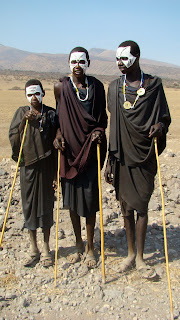Who are they? A Nilotic ethnic group of semi-nomadic people. They move from one area to another searching for water and pasture.
Where are they located? Northern Tanzania and Kenya.
What languages do they speak? The word Maasai comes from the word Maa, which is the language of the Maasai.
What is their origin? The Maasai originated from the lower Nile Valley, north of Lake Turkana. This lake is located in the Great Rift Valley in Kenya with its far northern end crossing into Ethiopia. It is the world's largest permanent desert lake and the world's largest alkaline lake.
Who are the Moran Maasai? Between the ages of about 14 and 30, young men are traditionally known as morans. During this life stage they live in isolation in the bush, learning tribal customs and developing strength, courage, and endurance.
What are they known for? They are a pastoralist group of tall, slender cattle herders. Moran wear distinctive red garments plastered with ochre mixed with cow fat. They have decorated faces, bodies and hair. Women have shaven heads and often wear many coils of beads on their neck and shoulders. Young men leave to become Moran before returning to begin family life.
Who makes their major decisions? Elder men, sometimes joined by retired elders.
What does the Maasai warrior carry? A spear and shield. Spears are a warrior's most precious possession and are used for defending herds and the community against predators. The shield is used for defense.
What is their lifestyle? It centers around their cattle which is their primary source of food.
What do their shelters look like? Houses are either star-shaped or circular, plastered with a mix of mud, sticks, grass, cow dung, water and ash.
What does it mean to be a warrior? To be a “Maasai Warrior” means your life belongs to society, not to your individual family. You are always ready to put your life on the line to defend any community you find yourself in. Your home is the earth; your people are those around you. You never eat at your parent's house without another warrior or a child to share the food with. You should not be selfish with your life or your food.”



Thank you Nelson, for educating us about all these places and people. i really hope these people find water because it looks like they have need of it! Beautiful photos as usual, and than you for your kind comments on my blog! Be blessed, Lori
ReplyDeletei enjoy reading the cultural information about your country. it's also interesting to see other people's photos of it aside from what my bf took a few years ago. it's definitely amazing to hear and see his perspective as a tourist and your perspective as a native. i like how the masai warriors define themselves as "you are always ready to put your life on the line and defend any community you find yourself in. your home is your earth, your people are those around you." i think there's a real sense of warmth, affinity and proudness that differs from the american culture (not in a bad way) where we are so focused on our armies, marines and armed forces.
ReplyDeleteif you have the time, here are the photos that he took in tanzania:
http://www.flickr.com/photos/65316636@N00/sets/72157607087362683/
Lori,
ReplyDeleteI appreciate you stopping by and commenting. Yes indeed these people have a need of running water. By touring Tanzania, you're supporting locals. A portion of TAfrica Safari’s income will go directly to the community in that particular cultural tour.
The cultural tour you will take in one of Tanzania’s community groups has an impact on the communities development. These funds will be used to:
-rehabilitate the primary school
-improve conservation of natural resources and cultural sustainability in that region
-support development projects
-preserve, promote and develop the culture
-improve educational facilities for HIV/AIDS orphans, homeless, abandoned and disabled children
-invest in agricultural projects
-and, protect the environment, promote education and empower women in the village.
This is me,
ReplyDeleteI appreciate you stopping by and commenting. I’m thrilled to hear that you like my post. Wonderful pictures from the link you sent to me. Thank you for the link..:)
Hi Nelson, the story of the Masai people are so interesting. I am a child from Africa myself and miss it so much! Africa is a unique place full of secrets and adventure. Great blog you have here!
ReplyDelete